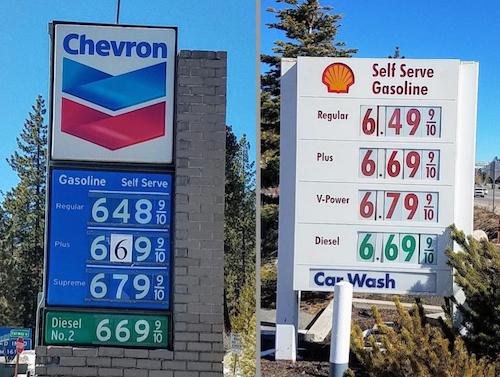
Gas prices in California on March 11. Anyone recognize where?
But as commenter @Jennifer suggested last week: “There's not much we can do about rates, but we can certainly control our usage.” She is onto something. By using less gas for heating and gasoline for driving, we can save money, reduce our reliance on imports, and make more gas available for export to Europe while they work to reduce their reliance on Russian oil and gas.
If you are thinking it’s too hard to use less, or not worth it, you may be surprised. I was by some of these, anyway…
Drive slower. I always assumed, without thinking about it very much, that since the highway mileage for gas cars is better than the mileage for driving around town, faster speeds don’t use more gas. Ha. Speeds above about 50 start chipping away at your mileage. There is a great calculator at fueleconomy.gov where you can see, for your car model, how driving faster costs you money. Scroll down on that page to “Obey the speed limit” and click on “What is the penalty for my car?”
The chart below shows the results for a 4-cylinder 2017 Toyota Camry, assuming gas costs $5.50. You can see that reducing your highway speed just 5 mph saves over $0.50/gallon. I’ve started using cruise control set to 65 when I drive on the highway and have noticed the difference. (1)
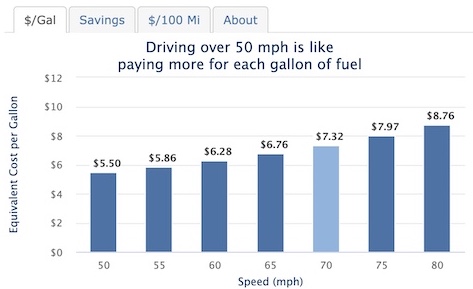
Driving a little slower on the highway saves money. Source: FuelEconomy.gov
There are other fuel efficiency tips on that site as well. Take a look.
Turn down your thermostat. This also makes a bigger difference than you might think. The International Energy Agency recently estimated that if all buildings in Europe turned down their thermostat by just 1 degree C (about 2 degrees F), it would immediately reduce imports from Russia by 6.5%, making it one of their top recommendations. They also estimate a household could save 7.5% on gas usage that way. Another approach is to get a smart thermostat that will turn down the temperature when you are out of the house or sleeping at night. These savings are wallet-friendly, planet-friendly, and national-security-friendly.
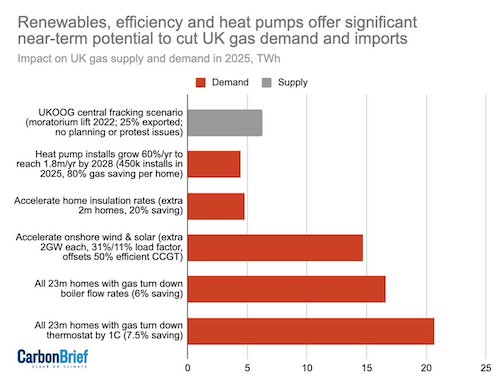
Turning down the thermostat (the bottom row) by just 1C has the biggest impact of several changes the UK might consider, and it can happen almost immediately. Source: Simon Evans of CarbonBrief
Drive something smaller or newer. I know, I know, sometimes we don’t have a choice of vehicles. But a big car can use twice the gas of a small car. An older pickup can use twice the gas of a newer one. That’s like changing the price of gas from $5.50 to $2.75. My sister’s household has two cars, and they are doing everything they can these days to use only the newer hybrid. Could that apply to you?
Get yourself some summer A/C. This may seem counter-intuitive, but summer A/C can also provide winter heat when you use a heat pump. With smoky and warmer summers on the horizon, efficient air-conditioners (heat pumps) are being adopted by increasing numbers of households in the Bay Area. If you get just one for the common area, you can use it for most of your heating in the winter, offsetting much of your gas use. If your house has leaky ducts, you can save extra by bypassing them with a ductless heat pump (aka mini-split).
Be careful who you listen to. A friend of mine who lives in Mountain View has a 10-year-old gas tank water heater and would like to save on gas. So she asked her plumber. “He said that there is no such thing as a fully electric water heater, and that we should get a tankless model.” Good grief. An electric heat pump water heater can reduce your gas use by one-third. And they are hardly esoteric. Here is a picture a reader sent me recently of his new heat pump water heater. He signed up with SunWork on Feb 8, it was installed just a few weeks later, and it cost him only $1275. (He and a friend helped out some with the work.)
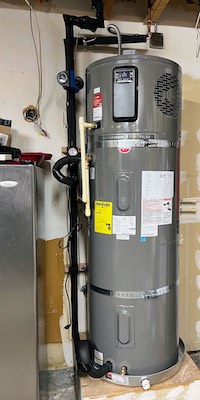
Below is a graph of gas use in our house over the last few years (2020 is missing because meter-reading gaps messed up the data). Can you see when we electrified our space heating? But our thermostat and overall bill didn’t change. Heat pumps work. Almost 180 million were used for heating in 2020.
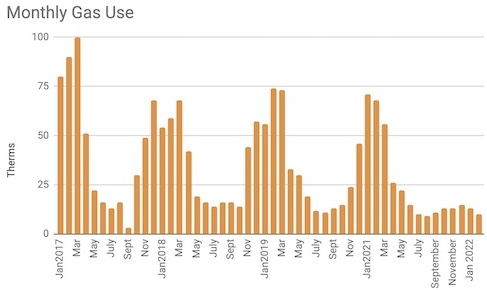
Seasonal gas use before and after getting a heat pump for space heating
There are lots of other ways to use less gas. Window coverings save energy in both winter and summer, as can attic insulation, sealing openings or chimney plugs. It’s getting to be the season for bikes (and e-bikes) for shorter trips. Has the crisis in Ukraine inspired you to use less gas or gasoline? If so, please share how in the comments.
Notes and References
1. I have an EV so I don’t save on gas, but I can save on highway-priced electricity and even forego a charge on some trips.
Current Climate Data (January/February 2022)
Global impacts, US impacts, CO2 metric, Climate dashboard
Comment Guidelines
I hope that your contributions will be an important part of this blog. To keep the discussion productive, please adhere to these guidelines or your comment may be moderated:
- Avoid disrespectful, disparaging, snide, angry, or ad hominem comments.
- Stay fact-based and refer to reputable sources.
- Stay on topic.
- In general, maintain this as a welcoming space for all readers.
I will remove comments that are off-topic (e.g., aggressively promoting an anti-nuclear agenda on a post unrelated to nuclear energy) or that are designed to provoke (e.g., asserting questionable statements as fact and politicizing topics). I will particularly tend to do this if the commenter also seems to be misrepresenting their residency. I hope this makes the comments more useful and easier to read. Please email me if your comment has been removed by mistake. There is an email link at the top of every post.
Finally, as a reminder for new readers, please ignore the "likes" count. The likes are easy to spam and a few people do spam them in order to make their opinions appear popular.



